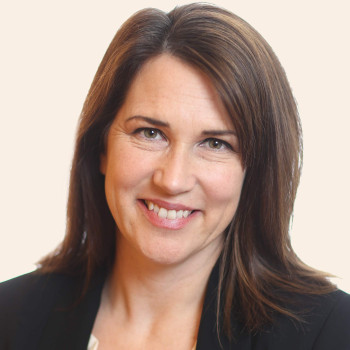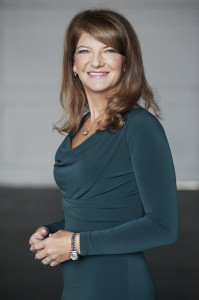Learning to be a leader

Charley Stoney, group managing director at Alternatives speaks to Tamara Whitney, sales director of Nestlé about her career progression, which includes commercial roles in some of the UK and Ireland’s leading food and drinks businesses such as Coca Cola and Premier Foods. She shares her views on a variety of subjects from the advantages of FMCG brands in the Irish market over the UK to how the gender balance in Nestlé is a “non-issue”
16 January 2015
 What do you believe are the key changes in your customers’ needs that allow you to differentiate yourself while still managing their pricing/margin expectations?
What do you believe are the key changes in your customers’ needs that allow you to differentiate yourself while still managing their pricing/margin expectations?
Fundamentally consumer needs haven’t changed. They need to trust your brands and yet still be excited by them so NPD is key. We always need to be conscious to differentiate ourselves for retail customers, so our expert brand status remains crucial. We are constantly deriving consumer insight, we help retailers differentiate their own offering based on their retail formats, and as category leader with a lot of our brands we provide retailers with relevant information that helps them to succeed.
Nestlé spends €2bn annually on innovation and this is where we come into our own, by making our products more relevant and exciting to a new generation, e.g. Maggi stands out in the food category as a great example of how an innovative brand can start small and grow in Ireland. In confectionery and pet care we’ve recently brought out new products in our Kit Kat and Felix brands.
How has your organisation responded to the challenge presented by the discounters?
They represent an interesting challenge as a supplier with brands that have been in the market for decades – Kit Kat is over 100 years old, and Nescafé is 50 next year for example. We are responsible for making sure that our brands will be as loved and enjoyed by the current and next generation of consumers. That means being where our shoppers are and we have to engage with discounters as their shopper profile is geared towards young couples and families so we make sure our brands are as visible there as they are in other stores.
Simultaneously we work with larger retailers who carry our full range, who support our NPD and with whom we have long-term and more strategic trading plans. We believe that there’s room in the market for both types of retailers and work to get the balance right.
Are you seeing any growth in line with the growing recovery of the Irish economy?
Not yet. We’re not seeing any metrics that show growth in the grocery sector and this is substantiated by the Kantar/Nielsen figures. It seems that people have a bit more discretionary spend but are choosing to spend it on larger items such as new cars rather than increasing their grocery bill. We saw people’s shopping trends change during the downturn and I’m not sure they’re going to return to where they were, at least not in the immediate term. So we need to help retailers respond to this long-term change in shopper behaviour.
What do you believe, beyond the core sales disciplines, are the must-have skill sets in today’s FMCG commercial team?
What’s different now to when I started my career is having a much broader understanding of the commercial world in which we operate, including government legislation and food industry guidelines.
Nowadays, data and insight gives a much better understanding of shoppers so we can respond quickly to consumer and customer needs. Category management strategy is vital and in Nestlé this function stands alone which I believe is the best way of working as it creates an unbiased viewpoint. It increases the need for cross-functional alignment and a much more collaborative way of working.
In your opinion, what are the key differences between the UK and the Irish market from a trading viewpoint?
I’ve joined an Irish team having worked in the UK so I can easily contrast and compare the two. The key difference in Ireland is how much freedom we have to market our brands at store level compared to the UK, where the retailer environment is more generic. I arrived here and the expectation was that thinking would flow one way but I’m continuing to take ideas from the Irish market and translating them back into the UK so really it flows both ways. We do some amazing brand and trade activation here that is best in class which the UK can learn from. Because the UK is a much bigger marketplace, commercial teams have a much narrower field of expertise, but the advantage of working in a smaller market is that you have to be more multi-focused so skills here are broader and cross several trading channels.
What makes a top leader in your organisation?
You need to demonstrate the appetite for leadership, it’s not just about wanting to climb to the top, you must be aware of the responsibility that comes with it and not everyone has the ability to be responsible for the numbers as well as the people that work for you.
How do you prepare the leaders of tomorrow – how did you prepare?
I am fortunate that I have always worked in companies who thought about the future of their business and put a lot of resources into building the leaders of tomorrow. In Nestlé, we identify top talent from the beginning (i.e. our graduate programme) and nurture and develop those people accordingly. I had that help as a young manager years ago and follow that example with my own team. It’s two-way: people put their hand up for future leadership and I look at how they operate to see if they demonstrate the skills to support the organisation moving forward.
Has being a female leader in what is still a very male-dominated sector been of help or hindrance to you throughout your career?
I can honestly say that my gender has never made a difference to my career. I work in a company where my peers are female and the Nestlé, UK & Ireland CEO is Fiona Kendrick and our country manager here in Ireland is Deirdre O’Donoghue so it’s not seen as anything special to be a leading female in this company. We have enough role models at a senior level for it to be a non-issue and I appreciate how lucky I am to be in that environment.
- Career planning
What key pieces of advice would you give your middle-level managers about getting to the senior level, and those at the senior level about getting to the C-suite?
You need emotional agility to balance between being reactive to customers’ needs and proactive in terms of moving the business forward. The Sales Institute is a great educational resource and networking environment for my team and we take full advantage of these types of organisations. Keep your knowledge broad; read the trade press; know competitor brands and what your customers are doing. Find mentors who can help and guide you.
My key piece of advice is that you and only you are fully responsible for your career path so take it seriously and identify where you want go to. At Nestlé, we put a huge amount of resources into training and guiding people through their careers but the onus is always on the individual to take responsibility themselves for seeking feedback and taking it on board to improve their skills.
Are there any obstacles you can identify?
I don’t think there are obstacles as long as you have your plan and listen to feedback as you progress. From an Irish perspective, it can help to broaden your knowledge by working across different countries so you can bring back fresh thinking to the Irish market.
What three things in your opinion are vital to the success of your business over the next three years?
- The core assets of a company are its people so ensuring that they’re nurtured, highly motivated and set up to succeed.
- Keeping the consumer at the heart of the business so we deliver the right shopping experience and help our customers provide the right environment for them.
- For Nestlé, the third success factor is what we call Creating Shared Value. It’s about making sure that we’re doing the right thing for future generations.
Alternatives works with companies like Nestlé to unearth the best talent in commercial, customer facing and marketing roles, and so help them become the leaders of tomorrow. For more information, contact Charley on cstoney@alternatives.ie.



 Print
Print






Fans 0
Followers